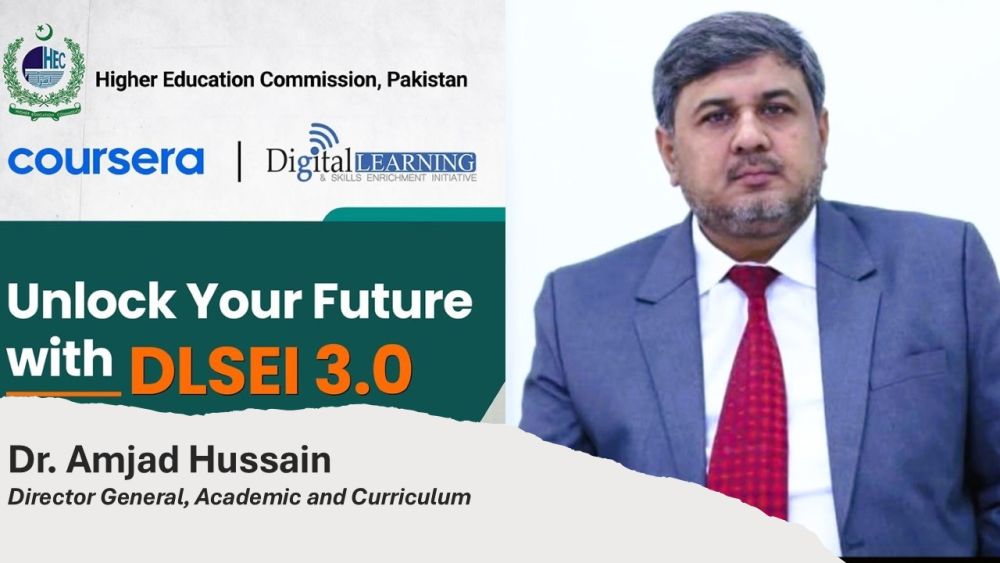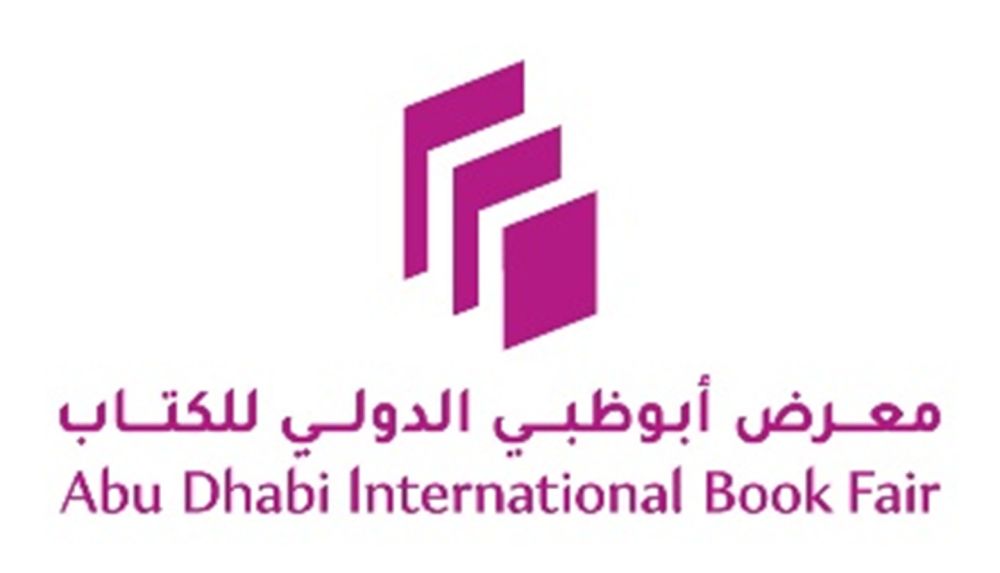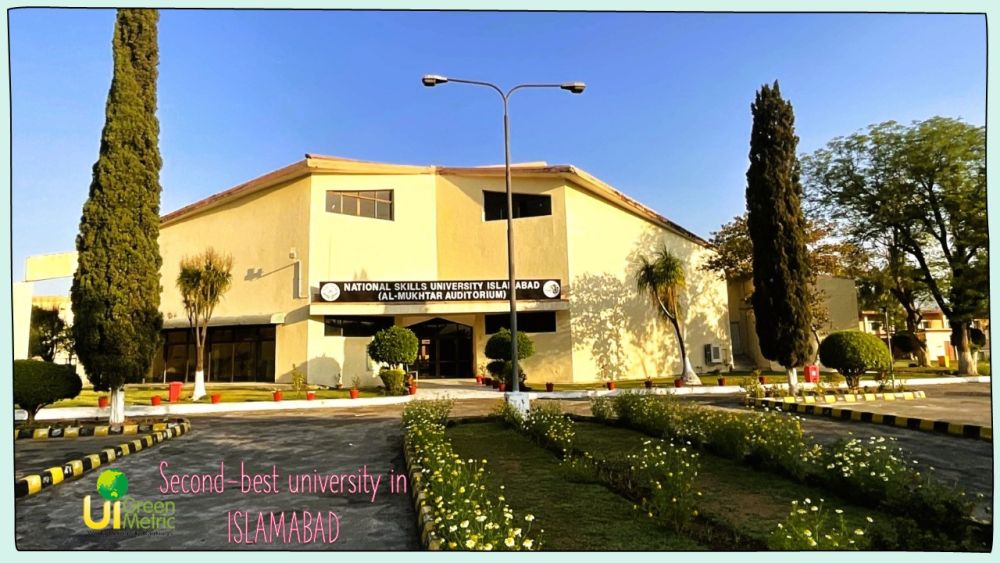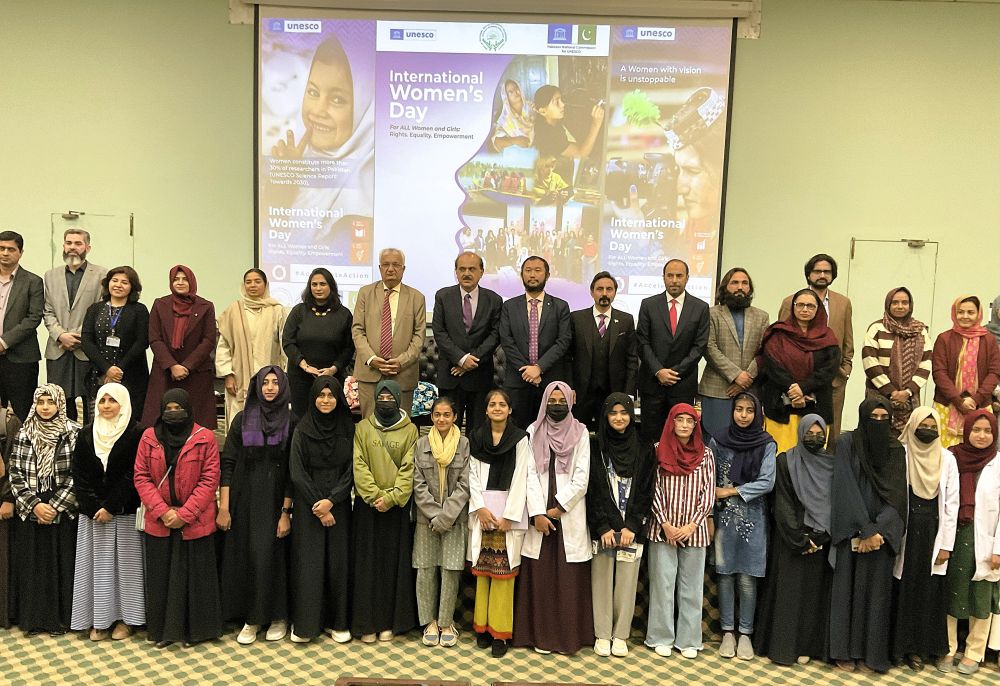220/25 Decoding Online Learning: What Pakistani Students Must Know About Certification and Coursera Courses
Posted 3 months ago
Authored By: Dr. Amjad Hussain, Director General Academic and Curriculum, Higher Education Commission, Islamabad, Pakistan
E-mail: adhussain@hec.gov.pk
In a transformative move for higher education in Pakistan, the Higher Education Commission (HEC) has partnered with Coursera to provide free access to thousands of online courses for students across all the country's Higher Education Institutions (HEIs). The Digital Learning & Skills Enrichment Initiative (DLSEI) opens up a world of learning opportunities, allowing students to gain knowledge and skills from top global universities and organizations without financial barriers. Adding to this momentum, HEC has recently issued an advisory to all Pakistani HEIs, urging them to make relevant certifications mandatory for students as part of their degree programs. This step aims to ensure that graduates are equipped with industry-recognized skills, bridging the gap between academia and the job market. However, as students explore Coursera’s offerings, many wonder about the difference between a Coursera course and a certification course, and how these courses can lead to valuable certifications. This article breaks it down for the general public, highlighting the opportunities available through HEC’s initiative and the new advisory.
HEC’s Coursera Initiative and the Push for Mandatory Certifications: An Empowering Change for Students
The HEC’s collaboration with Coursera means that students enrolled in Pakistani HEIs can access Coursera’s vast library of courses at no cost. Students can learn from institutions like Yale, Stanford, Google, and IBM, from computer science to business management, psychology to artificial intelligence. This initiative democratizes access to high-quality education and empowers students to build skills that enhance their employability in a competitive job market.
Building on this, HEC's latest advisory directs HEIs to integrate credited certifications into curricula, making them a mandatory requirement for graduation where relevant. This means universities must incorporate Coursera’s Professional Certificates or Specializations into degree programs, ensuring students complete and earn these credentials to gain academic credits. For instance, a computer engineering student might be required to finish the Google IT Support Professional Certificate to earn credits toward their degree, aligning coursework with real-world demands. This advisory underscores HEC’s vision for a skilled workforce, preparing Pakistani youth for global tech, data science, and digital marketing opportunities.
To make the most of this opportunity and the new emphasis on certifications, it’s crucial to grasp the distinction between a Coursera course and a certification course and how one can lead to the other. This understanding will guide your learning path and help you achieve your academic and career goals.
What is a Coursera Course?
A Coursera course is an online course offered on the Coursera platform and created by leading universities, colleges, or industry partners. These courses cover a wide range of topics, from academic subjects like Yale University's “Introduction to Psychology” to practical skills like the University of Michigan's “Python for Everybody.” They are designed for learners seeking personal enrichment, professional growth, or both.
Coursera courses typically include video lectures, readings, quizzes, and discussion forums. Through HEC’s initiative, Pakistani students can access these courses for free, including all content typically available in “audit” mode. This means students can learn without paying, though earning a Course Certificate may require additional steps (more on this later). Courses are usually 4–12 weeks long and offer flexibility for students to learn at their own pace.
What is a Certification Course?
A certification course on Coursera refers to a structured program, such as a Professional Certificate or Specialization, designed to teach in-demand skills for career advancement. These programs often consist of multiple courses that build on each other, culminating in a certificate demonstrating expertise in a specific field. For example, the Google Data Analytics Professional Certificate includes several courses covering data analysis tools and techniques. At the same time, the IBM Data Science Professional Certificate combines courses on programming, machine learning, and data visualization.
Certification courses are career-focused, often developed in collaboration with industry leaders like Google, Meta, or IBM. They include hands-on projects, assessments, and sometimes a capstone project to earn the certificate, which can be shared on resumes or LinkedIn to boost employability. Under HEC’s advisory, these certifications can now count toward academic credits, making them a key component of degree requirements.
Key Differences Between Coursera Course and Certification
While both Coursera courses and certification courses are available through HEC’s free access program, they differ in several ways:
Scope and Structure: A Coursera course is typically a single, standalone course focused on one topic, such as “Machine Learning” by Stanford. Like a Specialization, a certification course involves multiple courses that provide comprehensive training in a field, such as data science or digital marketing.
Certification: A certification course always leads to a certificate upon completion, often with academic credit under HEC’s new guidelines. A certificate is optional for a standalone Coursera course and may require payment or additional verification, depending on HEC’s terms for free access.
Duration: Coursera courses are shorter, often taking 4–12 weeks to complete. Certification courses, being multi-course programs, may take several months to complete.
Career Focus: Certification courses are designed with employability in mind, targeting skills in high-demand fields like IT, business, or data analysis aligning perfectly with HEC’s advisory for mandatory integration. Coursera courses may be career-oriented or geared toward personal interest, such as learning about philosophy or creative writing.
Cost: Under HEC’s initiative, both courses are free for HEI students to access. However, earning a certificate for a standalone Coursera course or a certification program may involve additional requirements, such as completing assessments or applying for a certificate through HEC’s framework.
How Can a Coursera Course Lead to a Certification? A Journey of Achievement
One of the most exciting aspects of HEC’s Coursera partnership and the advisory on mandatory certifications is that many standalone Coursera courses are part of larger certification programs. Students can start with a single course and build toward a valuable credential that counts for credits. Here’s how it works:
Start with a Standalone Course: For example, a student might enroll in “Introduction to Data Science” as part of their free access. This course could be one component of the IBM Data Science Professional Certificate.
Progress to a Specialization or Professional Certificate: If the student enjoys the course and wants to deepen their skills, they can enroll in the full Specialization or Professional Certificate program, which includes additional courses. Completing all required courses earns the certification, and under HEC’s advisory, it can fulfill mandatory credit requirements for graduation.
Leverage Free Access: As HEC covers the cost of course access, students can explore multiple courses within a program without financial barriers. However, students should check with their institution or HEC for details on obtaining certificates and credits, as this may involve specific processes, such as passing assessments or requesting verification.
Career Benefits: Certifications like the Google IT Support Professional Certificate or Meta Marketing Analytics Certificate are recognized globally and can open doors to job opportunities in Pakistan and beyond. By starting with a single Coursera course, students can test the waters and work toward a credential that enhances their resume and degree.
Why Does Certification Matters for Pakistani Students?
The HEC-Coursera initiative, combined with the advisory on mandatory certifications, is a golden opportunity for Pakistani students to gain skills that align with global industry demands. For instance, a computer science student could take “Python for Everybody” to learn programming basics and later complete the Python for Data Science Specialization to earn a Professional Certificate—and credits toward their degree. Similarly, a business student could start with a course on digital marketing and progress to Meta’s Marketing Analytics Professional Certificate, fulfilling HEC’s requirements while building career-ready expertise.
Students can strategically choose their learning path by understanding the difference between a Coursera course and a certification course. Those looking to explore a topic or gain quick skills can start with standalone courses, while those aiming for career advancement and mandatory credits can target certification programs. Coursera's flexibility, combined with HEC’s free access and advisory services, allows students to tailor their education to their goals.
Making the Most of the Opportunity Created by the HEC
To maximize this opportunity, students must:
Explore Coursera’s Catalog: Browse courses and programs in fields like technology, business, healthcare, or the arts to find what suits their interests and career goals, keeping HEC’s mandatory certification guidelines in mind.
Check with HEIs: Confirm with your university or HEC about the process for accessing courses, earning certificates, and integrating them for academic credits.
Plan for Certifications: If aiming for a Professional Certificate or Specialization, map out the required courses and set a timeline to complete them, ensuring compliance with your program’s mandatory requirements.
Showcase Achievements: Once earned, share certificates on LinkedIn or with potential employers to stand out in the job market.
The HEC’s partnership with Coursera and the advisory to make relevant credentials mandatory represent a bold step toward transforming Pakistan’s higher education landscape. Students can make informed choices about their learning journey by understanding the difference between a Coursera course and a certification course. Whether taking a single course to explore a new field or working toward a Professional Certificate to launch your career and fulfill degree credits, this initiative empowers you to learn, grow, and succeed. Visit your HEI’s portal or Coursera.org to start exploring today, and take the first step toward a brighter future.





